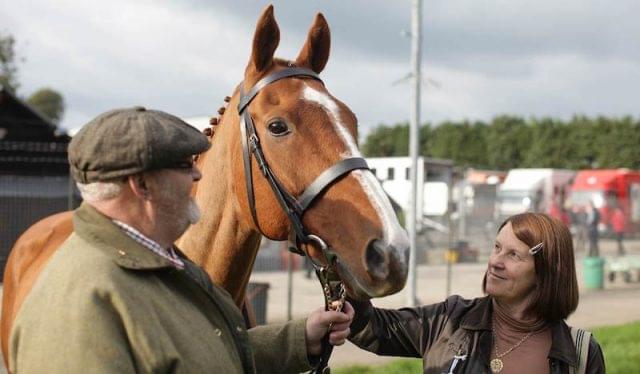
If you wanted to engineer a documentary for maximum appeal to the widest possible audience, you could hardly do better than “Dark Horse.” It’s a sports movie (insofar as horse-racing is a sport), but it hits most of the sweet spots for people who don’t particularly care about sports or documentaries: colorful characters, a lovable animal, an informative but not stuffy tone, a story you probably don’t already know, and a short running time. If you could breed movies like horses, this one could sire many champions.
An accomplished British filmmaker named Louise Osmond brings us to a quaint coal-mining village in Wales, where Jan, a twinkly-eyed, middle-aged barmaid, decided she wanted to breed a racehorse. She’d trained pigeons and whippets before, so it wasn’t a completely random whim … but it was close. Still, her husband, an affable, semi-toothless fellow named Brian, reports fondly that when Jan gets an idea into her head, you’d better stay out of her way.
Jan and Brian bought a broodmare (Brian’s haggling helped), paid for stud service, and soon found themselves the proud owners of a bouncing baby foal. Then came the real problem: horses are expensive to keep and train. That’s why racing is the domain of the wealthy and high-born, which of course is just fine with the wealthy and high-born. “They like to keep us commoners out, I think,” Jan says with a smile.
Assisted by a pub customer who worked as a tax adviser and had a weakness for horse-racing, Jan sold “shares” — £10 a week for the horse’s training and upkeep — to a couple dozen villagers, mostly older, working-class folks like herself. They named the horse Dream Alliance. Several of them appear on camera to tell the story of what happened next, their weathered faces and lilting Welsh accents contributing significantly to the story’s charm. They also play themselves in the reenactments that Osmond uses to fill in the gaps where no actual footage was available. (These reenactments are unobtrusive, fortunately, and don’t require anyone to do any real “acting.”)
Working-class stiffs co-owning a gangly, working-class horse is a situation with the potential to be a comical disaster or a rousing underdog success. You can probably guess how it turned out (I’ll give you a hint: they made a movie about it), but the specifics of Dream Alliance’s racing career make for an utterly beguiling story, full of dramatic tension, setbacks, victories, and surprises. Dream Alliance isn’t terribly fast at first, but he’s a scrapper. The hoity-toity people in the racing community view him with the same snobbery they view his owners with, which of course makes it all the more satisfying when they realize they’ve underestimated them.
“Dark Horse” digs into racing as a sport only a little bit — enough to convey the thrill of victory and the agony of defeat, and to give the uninitiated sufficient background to understand the British horse-racing system. The film’s broader goal is more sentimental: Jan, Brian, and the rest of the owners really love this horse. Hearing these humble, unpretentious villagers, some of them gruff in appearance, describe their affection for Dream Alliance is bound to put a smile on anyone’s face.
B+ (1 hr., 26 min.; )





